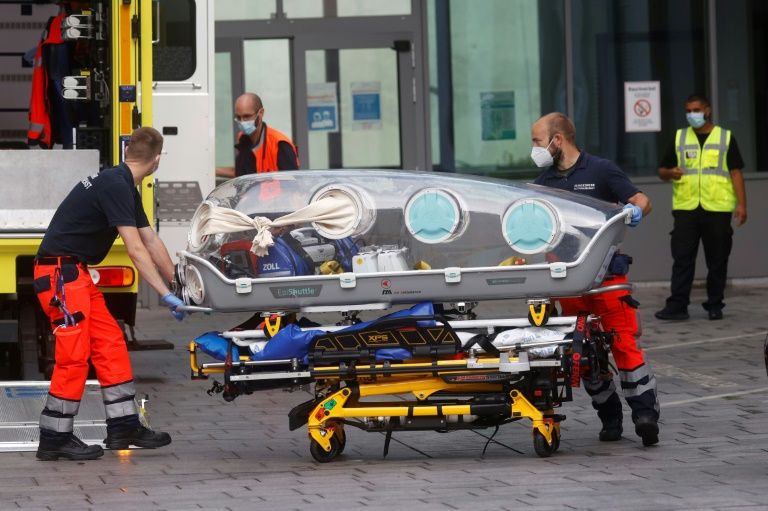Kremlin critic Navalny ‘stable’ in Berlin hospital

Kremlin critic and opposition leader Alexei Navalny, who has suffered a suspected poisoning, was in a stable condition in hospital on Saturday after being flown to Berlin following a standoff over his medical evacuation from Russia.
An air ambulance carrying Navalny, chartered by the German NGO Cinema for Peace, touched down at 8:47 am local time (0647 GMT) at the military wing of Berlin’s Tegel airport.
His spokeswoman Kira Yarmysh tweeted that “the plane with Alexei just landed in Berlin”.
“Navalny’s condition is stable,” Jaka Bizilj, the head of the Cinema for Peace foundation, told AFP after the landing.
Berlin’s Charite hospital confirmed in a statement that it had admitted Navalny and was carrying out an “extensive medical diagnosis”.
The 44-year-old lawyer and anti-corruption campaigner, one of President Vladimir Putin’s fiercest critics, went into a coma after falling suddenly ill Thursday on a plane to Moscow that had to make an emergency landing in Omsk.
Aides say they believe Navalny was poisoned, apparently by a cup of tea at the airport, and blamed Putin, though Russian doctors said tests showed no trace of any poison.
Doctors treating him in Omsk had refused to let Navalny leave but reversed course after his family and staff demanded he be allowed to travel to Germany.
As the plane left Omsk at around 8:00 am local time (0200 GMT), Navalny’s wife Yulia posted a picture on Instagram of him being carried on a covered stretcher and thanked supporters for their “persistence”.
“Without your support, we wouldn’t have been able to take him!” she wrote.
Russian doctors have said he is in a coma and breathing through a ventilator in a grave state.
They have said tests did not find any trace of poison, however, that Navalny appeared to have a “metabolic disorder” and to have suffered a sharp drop in blood sugar levels.
The regional interior ministry said police detected an industrial chemical after swabbing Navalny and his luggage, although doctors said this would not have caused his condition.
The air ambulance arrived in Omsk on Friday morning but Russian doctors initially said Navalny was too “unstable” to be moved.
– Appeal to Putin –
They announced on Friday evening they had agreed to let him be transferred after German doctors examined him and the Cinema for Peace foundation said they were “willing and able” to transport him to Berlin.
The turnaround also followed a letter from Navalny’s wife with a direct appeal to Putin and after aides asked the European Court of Human Rights to intervene with the Russian government.
Navalny is the latest in a long line of Kremlin critics who have fallen seriously ill or died in apparent poisonings.
His wife told journalists that she wanted Navalny to be “in an independent hospital, whose doctors we trust”.
Yarmysh tweeted that “the battle for Alexei’s life and health is just beginning… but at least now we’ve taken the first step.”
The air ambulance was dispatched to take Navalny to Berlin after Chancellor Angela Merkel extended an offer of treatment.
European Union leaders including Merkel and French President Emmanuel Macron have voiced concern for Navalny, who has faced repeated physical attacks and prosecutions in more than a decade of opposition to Russian authorities.
Navalny lost consciousness shortly after his plane took off on Thursday from Tomsk in Siberia, where he was working to support opposition candidates ahead of regional elections next month.
Yarmysh said he had seemed “absolutely fine” before boarding the flight and had only consumed a cup of tea at the airport.
She said she was sure he had suffered from an “intentional poisoning” and blamed Putin.
– ‘Freed hostage’ –
She also claimed Russia’s refusal to evacuate Navalny was a ploy to “play for time” and make it impossible to trace poison, posing a “critical threat to his life”.
Navalny has made many enemies with his anti-corruption investigations, which often reveal the lavish lifestyles of Russia’s elite and attract millions of views online.
He is the latest in a long line of Kremlin critics who have fallen seriously ill or died in apparent poisonings.
The director of the Anti-Corruption Foundation that Navalny founded, Ivan Zhdanov, confirmed on social media that the organisation was “continuing its work”.
“I feel as relieved now as if terrorists had freed a hostage after long negotiations,” fellow opposition politician Ilya Yashin tweeted, criticising the delay in Navalny’s departure.
“I want to believe that this wasted time won’t cost Alexei his life.”
SOURCE: AFP
PHOTO: German army emergency staff load into an ambulance a stretcher used to transport Russian opposition figure Alexei Navalny to Berlin’s Charite hospital. AFP










